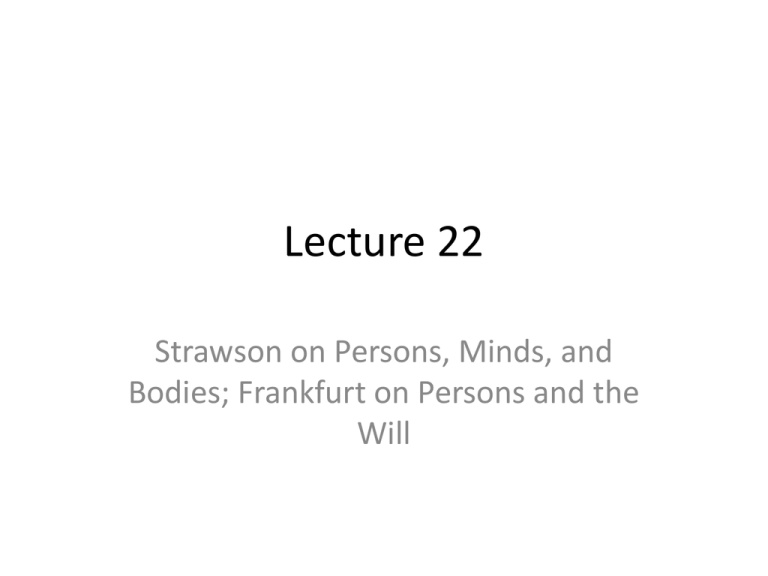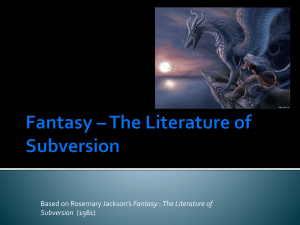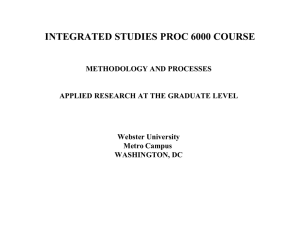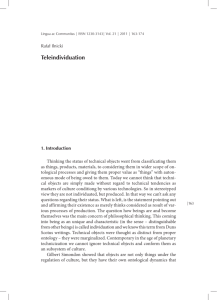Lecture-22-Strawson-and-Frankfurt
advertisement

Lecture 22 Strawson on Persons, Minds, and Bodies; Frankfurt on Persons and the Will STRAWSON ON PERSONS, MINDS, AND BODIES Strawson’s Second Argument Strawson’s Second Argument: 1. 2. 3. 4. 5. 6. 7. A concept is legitimate only if we can give acceptable individuation conditions for it, i.e., only if we can say whether two of its instances are identical or distinct. (Premise) The only acceptable individuation conditions for the concept of a mind involve the concept of a person. (Premise) If the individuation conditions for a concept C1 involve the concept C2, then C1 depends on C2. (Premise) The Cartesian holds that the concept of a mind is independent of the concept of a person. (Premise) The Cartesian cannot employ the only acceptable individuation conditions for the concept of a mind. (From 2,3,4) The Cartesian cannot give acceptable individuation conditions for the concept of a mind. (From 5) The Cartesian’s concept of the mind is not legitimate. (From 1,6) Premise 1 • Premise 1: A concept is legitimate only if we can give acceptable individuation conditions for it, i.e., only if we can say when two of its instances are identical or distinct. • Some examples of individuation conditions: – A class or set or collection A is identical to another B if and only if every member of A is a member of B, and vice versa. – A property F is identical to a property G if and only if every F is necessarily a G, and every F is necessarily an F. – A musical group/performer a is identical to a musical group/performer b if and only if… ? – A physical object O1 is identical to a physical object O2 if and only if… ? Why Do Individuation Conditions Matter? • Without acceptable individuation conditions for minds, the Cartesian cannot justifiably assert that there is a single mind associated with a given living, human body, rather than a thousand minds. Premise 2 • Premise 2: The only acceptable individuation conditions for the concept of a mind involve the concept of a person. • These unique, acceptable individuation conditions are… • The Anti-Cartesian’s Individuation Conditions for Minds: A mind M1 is identical to a mind M2 if and only if M1 and M2 belong to the same person. • Doesn’t this just push the problem back to the individuation conditions for persons? – The anti-Cartesian "does not have to pretend that the question as to what the criteria of personal identity are is an easy or straightforward question. But he can properly point out that we have, and know how to use, adequate criteria for ordinary cases; and that we can perfectly intelligibly discuss how our criteria should be interpreted or adapted for any extraordinary cases which we might encounter or imagine" (Strawson, Self, Mind and Body, 191). Premise 3 • Premise 3: If the individuation conditions for a concept C1 involve the concept C2, then C1 depends on C2. (Premise) • Inserting our account of conceptual dependence, the premise says: If the individuation conditions for C1 involve C2, then a full account of C1 would involve C2. • Plausible, since individuation conditions are plausibly part of the “full account” of the concept. FRANKFURT’S “FREEDOM OF THE WILL AND THE CONCEPT OF A PERSON” Frankfurt’s Objection to Strawson • Strawson’s Account: A person is a being that has both physical and mental properties. • Frankfurt’s Objection: There are animals that have both physical and mental properties, but that are not persons. – Example: The giraffe is tall; the giraffe is afraid of spiders. Does “person” mean “homo sapiens”? • No: • The idea of a person should "capture those attributes which are the subject of our most humane concern with ourselves and the source of what we regard as most important and most problematical in our lives" (6). • These important attributes could be equally significant if they belong to other species. – Apes maybe? – Vulcans? Frankfurt’s Account • A person is a being who can have second-order desires (of a certain kind). • A second-order desire is a desire for a desire. – Example: I do not desire kale when I’m hungry, but I wish I did; I desire to desire kale when I’m hungry. Two Kinds of Second-Order Desire • Frankfurt maintains that a person is a being who can have secondorder desires of a certain kind. • Two kinds of second-order desires: – A second-order desire for an inefficacious desire. • Example: The physician who desires to desire a narcotic, but who does not desire to have his desire for the narcotic satisfied. – A second-order desire for an efficacious desire. • Example: My desire to desire kale when I’m hungry. • It’s this second kind of second-order desire that, according to Frankfurt, is constitutive for personhood. – Call the second kind of second-order desire second-order volition. Renton and Sick Boy, the Drug Addicts • Renton and Sick Boy are drug addicts. • Renton and Sick Boy both desire to shoot heroin (they’re addicted to it). But they also desire not to shoot heroin (they want to quit). • Renton, the unwilling addict forms a second-order volition to not shoot heroin—he wants the desire to not shoot heroin to be efficacious. • Sick boy, the wanton, has no second-order volition.










